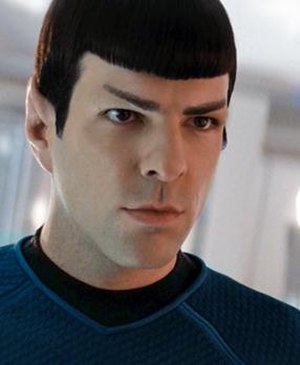 Image via WikipediaYes, I saw the Trek reboot on Saturday. Yes I liked it. No, it wasn't perfect, but that's not just me being a fanboy or an impossible-to-please critic (though I am both of those things). The movie had flaws, but they were outweighed by one inimitable factor that the film had in spades--and which almost every other Trek movie in the last 20 years has lacked--fun.
Image via WikipediaYes, I saw the Trek reboot on Saturday. Yes I liked it. No, it wasn't perfect, but that's not just me being a fanboy or an impossible-to-please critic (though I am both of those things). The movie had flaws, but they were outweighed by one inimitable factor that the film had in spades--and which almost every other Trek movie in the last 20 years has lacked--fun.The new Star Trek is fun. It's funny. It has action. The characters are designed to be likable and interesting, not just allegories for whatever social group or psychological foil was necessary to drive the plot. There was no larger message about tolerance or human potential, it was just about the popcorn and the whiz-bang spectacle.
That, quite frankly, is the best we can hope for from a mainstream Star Trek movie. It's also why no mainstream movie can ever do justice to Star Trek.
I'm not talking about the bad science or the bad tactics or the plot holes (and more and more plot holes) you could fly a Klingon warbird through--those have been staples of all versions of Trek and, to a larger extent, nearly all filmic science fiction since day one. I'm also not talking about the inevitable (or imagined) knee-jerk fan backlash against anyone new taking on the classic Trek roles. I'm talking about what Star Trek stands for, and what is missing from this Trek movie--a moral.
Star Trek has always been a morality play dressed in sci-fi drag. The lessons were sometimes ham-fisted or cloying or maudlin, but there were lessons. Even as bad as Voyager and Enterprise got--and they got really bad--they still fumbled towards a moral or a theme in almost every episode (the dreadful series finales notwithstanding).
In the new Star Trek, the closest we get to a moral or a comment on the human condition is Spock's outrage at how racist the "logical" Vulcan leadership seems to be against humans and halfbreeds, or the notion that Kirk shouldn't let his father's death be an excuse for wasting his potential. These appear more as character inflections than social commentary.
Put more damningly, the new Star Trek is of closer kin to Independence Day than to "City on the Edge of Forever." That makes a real gee-whiz fun action ride, but nothing really approaching art. Many, many Trek episodes stand as some of the finest hours of television ever produced. No one would ever make the same claim about a Trek movie, except perhaps Wrath of Khan, which is really just a tightly scripted Moby Dick pastiche.
In fact, I'd argued that making Trek serve a mainstream cinematic audience is what killed it (and it certainly killed the Borg). Trek is at its best when it isn't trying to please such a wide swath of the viewing public, and is content--or, rather, not content unless--to tackle why and how the extraordinary artifice of science fiction can illuminate and instruct our own contemporary experience. That's the job of a television series, which has 20 or so hours every year to tell a succession of small or large stories focusing on one or more characters, as each best befits the moral and artistic goals of the show.
I'll leave it to greater minds than mine to determine whether Trek succeeding is good for science fiction as as a whole, but I will say that this Trek succeeding on the big screen could have disastrous consequences for the Trek franchise itself. It could turn Trek into solely a movie phenomenon, and widescreen is often a shallow medium. It seems financially unlikely that Paramount could afford to cast the current movie versions of Kirk, Spock et al as TV stars in a new Trek series, which is a loss. Trek belongs on television. (I'd argue the reverse is true of Star Wars; it functions best as a mainstream widescreen thrillride, and crumbles when stretched to navel-gaze at its own origins with prequels or TV series.)
The new Star Trek cast is fantastic, and the public's newfound demand for their takes on the characters will likely preclude an new Trek on TV. That means the look and feel and faces of the old Star Trek weren't the only casualties of this fun-and-fizzy new Trek reboot--so was Star Trek's heart. And that is a loss indeed.

No comments:
Post a Comment